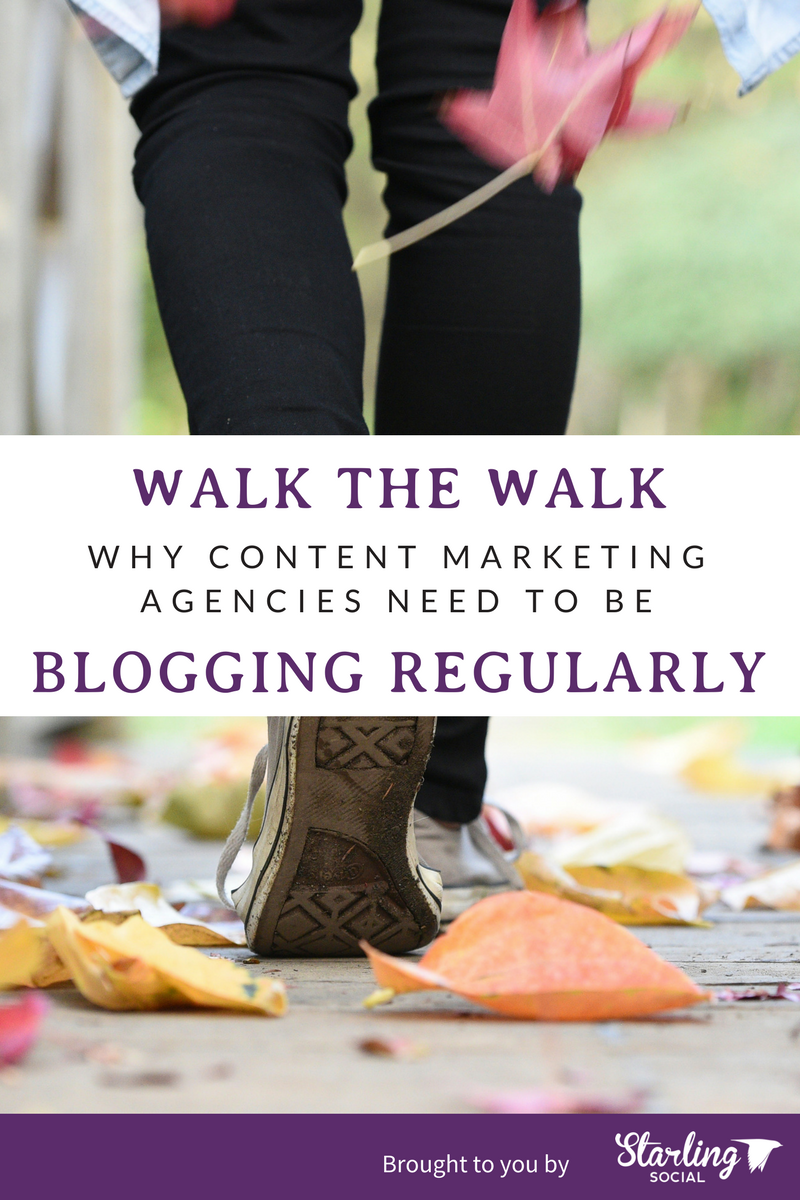Walk the Walk: Why Content Marketing Agencies Need to be Actively Blogging
- by Alyson Shane
This post comes from our Owner, Alyson Shane.
As content marketers we often "talk the talk" about digital marketing. We have meetings, conference calls, planning days, and spend the majority of our time preaching the positive benefits of a robust and well-developed content marketing strategy for our clients.
We understand that blogging is one of the key components of a strong content marketing strategy. We know that your brand's website should act as the "hub" of all you do and say online, with your social networks, newsletter, advertising, and other additions feeding your customers back to your website where they can take action and start their journey through your business' sales pipeline.
We also know that generating content not only provides your audience with a reason to visit your website and helps with SEO, but that it also plays a pivotal role in differentiating your brand from your competitors by positioning you as a thought leader in your industry.
But here's a thing I've noticed recently: many digital marketing agencies don't "walk the walk" when it comes to creating their own original content. Their blogs are lackluster, and the content they produce relates to their own internal challenges, not those of their prospective clients.
Here's why agencies need to step up their content game:

Your Customers Care About Your Content
Look, it's great that your company had a BBQ, but a blog post about it doesn't really convey the ROI of your services to your potential customers, does it?
Even the most well-written, optimized website isn't going to convert leads unless you can give them a reason to stay engaged. As far as websites go, the best way to provide them with this reason is to regularly publish content that speaks to your customer's pain points and answers their questions. This means developing blog copy which demonstrates the following qualities:
- Informational + detailed. Blog posts should be info-packed and use data, statistics, and examples (when applicable) to back up your findings.
- Comprehensive. If you can't fit everything you want to say into a single post then consider breaking it into multiple posts or reworking it into a piece of gated content.
- Easy to understand. Remember that the readers who fit an agency's Ideal Customer Profile (ICP) are likely only tangentially interested in the content, and are more focused on it as a means of showcasing why your agency would be a good fit with their own.
- Personalized. Don't just explain how to do something, but explain why your brand believes that this is the best solution (stats and case studies help here, as well.)
So if a CEO of a large digital marketing agency is blogging about managing employee burnout, for example, that post doesn't add anything to their company's ROI other than showcasing that they're mindful not to overwork their employees. This is great, but it doesn't help a prospective client understand how they can solve their digital marketing challenges.
What leaders can do:
If you run a digital marketing agency and you (or anyone on your team) have been blogging about anything that doesn't directly solve or answer a question one of your prospective customers may be asking, start your own blog where your content won't detract from the overall quality of your company's content.
That way your agency can begin developing content topics which are more customer-centric while still allowing you to blog about being a leader, business owner, and other more personal topics which aren't directly related to industry thought leadership and customer acquisition.
Showcasing Your Value Through Thought Leadership
Before I founded Starling Social I worked for a real estate agent managing his marketing and social media. When I brought up the topic of blogging a as way to drive inbound traffic he balked, saying:
"I don't want to share my secrets with other people in my industry."
Let's clear one thing up: there are virtually no 'secrets' to most industries these days. The explosion of content marketing has all but eliminated these 'silos' of industry secrets, especially when it comes to the digital marketing landscape. Websites like HubSpot, Buffer, Social Media Examiner, the Digital Marketing Institute, and more regularly provide timely and comprehensive content relating to all aspects of a digital marketer's job.
I can hear your real estate agent answer already:
"So, why should I write about what we do if they're already doing it for me?"
The answer is simple: because you're not HubSpot, Buffer, Social Media Examiner, or the Digital Marketing Institute. We live in the age of information, and customers and consumers expect to not only be able to thoroughly research a brand and their products and services, but to have the means to develop a well-rounded impression of the company and their values.
Unless you're an enterprise digital marketing marketing agency who is already regularly publishing blog content, then you need to step up to the plate and start sharing what you know so you can start to differentiate yourself from all the other digital marketing agencies out there.
It's this impression that's key, because it determines whether your future customers reach out to you or not.
What leaders can do:
Spend some time talking to to your leadership and staff about the questions, challenges, and processes they use and encounter day-to-day and craft content around their feedback.
For example, talking to your Sales reps may yield a few blog posts which answer key customer questions, or talking to your Account Managers may yield insight into a process you can explore in an upcoming post.
Really, the content is limitless. All you need to do is ask and listen.
Not Just "How," But "Why"
As digital marketers we have a responsibility to convey not just how what we do, but why we do it, as well.
Remember: the majority of people reading your blog content aren't other digital marketers. Being able to articulate your agency's thought process helps humanize your brand and demonstrates that not only have you and your team thought about solving your client's challenges, but that you understand it well enough that you can articulate it in an easy to understand, comprehensive blog post.
For example, a post with the title "5 Hashtag Secrets to Boost Your Brand on Instagram" is likely going to drive a lot of click-throughs, which is great! But if the content in the post doesn't dive into why hashtags are important, how to avoid hashtag abuse, and some strategies to finding hashtags relevant to the reader's target audience then it's not a very useful post, and it doesn't do much to convey an agency's understanding of those tools, steps, and processes.
Speaking of processes: it's not enough to say "we're process based" - agencies need to provide examples of the steps, tools, and processes that they use with their clients in order to show prospective costumers that they not only understand what they're doing, but that they understand it well enough to replicate that same success regardless of a new client's industry, target audience, and ICP.
Otherwise they're just making statements that aren't backed up by quantifiable understanding and shared knowledge, and prospective clients need to do more guesswork in order to determine whether the agency is a good fit for their brand or not.
What leaders can do:
Take a look at your agency's process documentation* for insights into how and why you take the steps you do on a per-client bases, as well as overarching insights for each social network, step-by-step instructions, and the like. Look for ways to break this knowledge down into "snackable" blog posts which can be used to target specific buyer types and showcase your team's understanding of what you do.
*If your agency doesn't have well-developed process documentation then back up, do not pass 'Go', and spend some time developing these documents, as they're critical to understanding your own agency as well as your clients.
Want to chat more about why blogging is the best way to convey the ROI of your digital marketing agency? Tweet at me or drop me a line on my website, I'm always happy to explore new ideas.
If you're a brand looking to step up your digital marketing game, get in touch with us and learn more about how Starling Social can help your brand grow, connect with your target audience, and convert that audience into lifelong customers.

